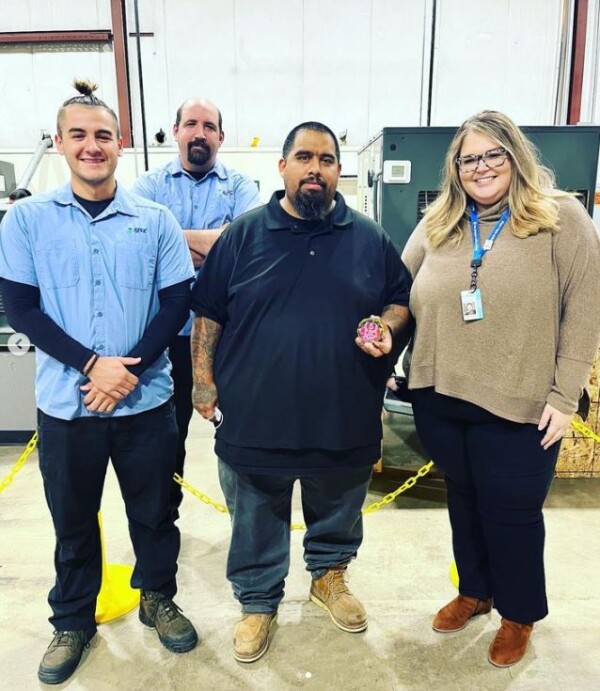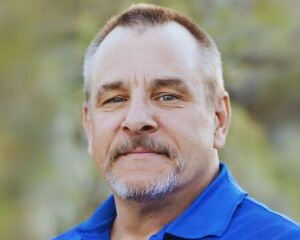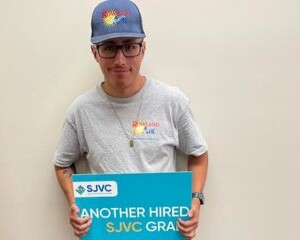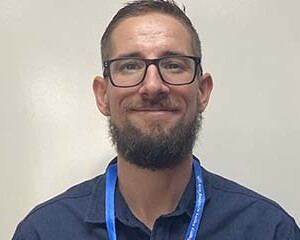From Student to Teacher: Faculty Q&A with HVAC-R Instructor Fernando Torres

Ex-military guy, Fernando Torres, was a career floater. He was good with his hands, so he drifted into factory jobs, handyman work: plumbing, dry wall, painting, flooring – things he had learned growing up and living with grandparents. He wanted to use his GI Bill for formal education but was concerned that his PTSD might make it difficult to be in a crowd of students. He had to chance it.
“I enrolled in community college for a semester, but I could not do the crowds,” he remembers. “Hundreds of people on campus freaked me out.”
Someone suggested SJVC in Visalia. Smaller campus, smaller classrooms, fewer people. The Heating, Ventilation, Air Conditioning, and Refrigeration (HVAC-R) program might be a fit. Fernando was willing to consider the idea. “I had a friend in the industry, and I thought I would give it a shot.”
How did that decision work out for you?
I always enjoyed working with my hands and even though I didn’t know anything about this industry, I knew I wanted something other than working in factories.
I liked all the different avenues it opened up to me: industrial, commercial, residential. There was a variety of directions I could go. I learned things that really added to my arsenal; I really liked that. And, even though it’s a ‘working trade’, there’s still a level of professionalism.
What was the ‘real world’ of HVAC-R like for you post-graduation?
I got a job with a property management company as their lead HVAC guy. I managed 1,400 residential units in several cities. It was intense: gas, electric heat pumps, hydronic systems for hundreds of apartments. I was able to job-out to other contractors and double-check their work to make sure everything was up to par.
In the summertime, I was always sweaty and dirty. And, if I didn’t come home tired, I felt like I hadn’t really done anything worthwhile. That was my way of feeling like I’d accomplished something. My grandpa lied to me when he said, ‘If you go to school, you’ll never have to work hard in your life.’ But I was good with that.
Were you surprised when SJVC invited you to apply for a HVAC-R faculty position?
SJVC’s Division Manager of all the trades and business programs encouraged me to apply for the HVAC-R faculty position. I’d never been in a panel interview before, and it freaked me out. I knew people on the panel (from student days) and I knew it could go either way. But I wanted to see if I could do it. I really enjoyed this field and I felt my goals would be to give my students what I didn’t always get.
What is your teaching style?
Teaching was not totally new to me; I conducted training exercises in the military, so I knew how to teach someone that didn’t know anything. My biggest goal as a teacher is always to focus their (student) energy and to work as a team. It increases their chances of success.
When students have a question, I sometimes tell them to ask the guy next to them: not for the answer, but how they got to the answer. Everybody learns differently and they can lean on each other to become a tighter group. If someone is still puzzled, I’ll put them in a group that will help them pick it up better.
What does team-building look like?
Like any classroom, there are cliques. I like to shake things up at the end of each module and change the seating chart. Students have to refocus their energy to being themselves wherever they’re at – like it’s going to be for them out in the field.
We also have BBQs outside with burgers, hot wings; it helps them build that team. If they see someone else slacking – going out to the smoking area too much – they stay on top of each other.
What excites you about your role as HVAC-R instructor?
Technology is always changing and testing new things out for the students to learn is fun. I get to go to conferences that cover new technology and new laws going into our field. I get to bring that back to show students new concepts, tools, and standards.
The school supports us. If I need something for the shop, they take care of it. I don’t stress coming to school. I enjoy it.
Was it difficult for you to transition from the ‘field’ to the classroom?
It took me about a year to get in sync with moving from a blue collar way of doing things to using a more professional approach to communication. Being behind a desk and computer wasn’t my thing. But helping my students become successful was something that excited me. And even though this is a ‘working trade’ it still requires a certain level of professionalism. You can’t talk a lot of smack.
I also found the encouragement and support from my Division Manager to get my Bachelor’s degree in 2019.
What is your goal for HVAC-R students?
When they leave this shop, this program, I want them to understand what they’re doing. They are able to do the work, perform their job and build from there. We help you build that foundation and what you do beyond that is up to you.
Financial security. Some students don’t know what it’s like to make over minimum wage. I give them examples of what other graduates have accomplished, along with the highs and lows of the industry. Negotiation is an important concept I introduce them to. I tell them to ‘Shoot high; you’ll end up closer to the top’.
How has SJVC’s HVAC-R program evolved over time?
We’ve made great improvements over the last five years. We’ve overhauled the curriculum and I’ve found new labs for students to help them better understand concepts. We guide our students to look online and use YouTube to help them understand a technique or procedure better. I’ve had the opportunity to look at what everyone else is doing and I can tell you that, when it comes to our shop and the things we have to show our students, nobody has us beat.
How does SJVC’s HVAC-R program compare to others?
Sometimes an Admissions Advisor will bring in a prospective student who is still on the fence about a HVAC-R program or future job in that area. After they see what we have, what we offer and what they can do with all that, they’re in. They can see it working for them.
We have a poster that says (in part): “Face it, nobody owes you a living. What you achieve, or fail to achieve in your lifetime, is directly related to what you do, or fail to do. Choose your own direction.”
To what do you attribute the success of the HVAC-R program and its graduates?
It’s a three-part story: Hope/Struggle/Success. Some come in, mess around, then realize they have this chance to have something. They scramble when they figure that out. I see their progress and it’s very rewarding.
I make sure it’s a team (effort). I’m not easier or harder; I just get them used to deadlines. I give them the information; but they take it and run with it.
What has been your greatest reward as HVAC-R instructor?
Seeing students complete the program, graduate, and hear them talk about what they’re doing in the field and knowing that I got to help. I got to be part of them being where they’re at.
I see them in the field and they’re loving it. They’ve got a new motorcycle, they achieved their goals, got what they wanted. They saw and achieved their goals.
You might also like
More stories about
Request Information
All fields using an asterik (*) are required.


